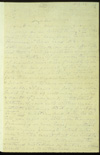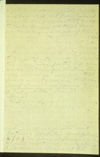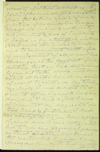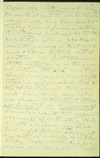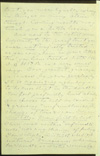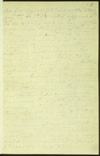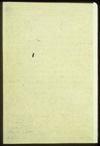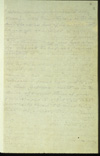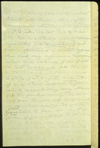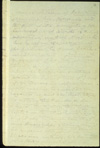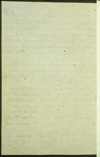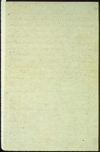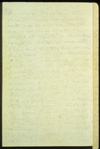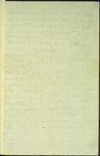Mahatma Letter No. 126
| Quick Facts | |
|---|---|
| People involved | |
| Written by: | Koot Hoomi |
| Received by: | A. P. Sinnett |
| Sent via: | unknown |
| Dates | |
| Written on: | unknown |
| Received on: | July 18, 1884 |
| Other dates: | unknown |
| Places | |
| Sent from: | unknown |
| Received at: | London |
| Via: | unknown |
This is Letter No. 126 in The Mahatma Letters to A. P. Sinnett, 4th chronological edition. It corresponds to Letter No. 62 in Barker numbering. See below for Context and background.
< Prev letter chrono
Next letter chrono >
< Prev letter Barker
Next letter Barker >
Cover sheet
|
LXII ? written in
|
NOTES:
|
Page 1 transcription, image, and notes
My poor, blind friend — you are entirely unfit for practical occultism! Its laws are immutable; and no one can go back on an order once given. She can send on no letters to me, and the letter ought to have been given to Mohini. However, I have read it; and I am determined to make one more effort — (the last that I am permitted) — to open your inner intuition. If my voice, the voice of one who was ever friendly to you in the human principle of his being — fails to reach you as it has often before, then our separation in the present and for all times to come — becomes unavoidable. It pains me for you, whose heart I read so well — every protest and doubt of your purely intellectual nature, of your cold Western reason — notwithstanding. But my first duty is to my Master. And duty, let me tell you, is for us, stronger than any friendship or even love; as without this abiding principle which is the indestructible cement that has held together for so many milleniums, the scattered custodians of nature's grand secrets — our Brotherhood, nay, our |
NOTES: |
Page 2
|
doctrine itself — would have crumbled long ago into unrecognisable atoms. Unfortunately, however great your purely human intellect, your spiritual intuitions are dim and hazy, having been never developed. Hence, whenever you find yourself confronted by an apparent contradiction, by a difficulty, a kind of inconsistency of occult nature, one that is caused by our time honoured laws and regulations — (of which you know nothing, for your time has not yet come) — forthwith your doubts are aroused, your suspicions bud out — and one finds that they have made mock at your better nature, which is finally crushed down by all these deceptive appearances of outward things! You have not the faith required to allow your Will to arouse itself in defiance and contempt against your purely worldly intellect, and give you a better understanding of things hidden and laws unknown. You are unable I see, to force your better aspirations — fed at the stream of a real devotion to the Maya you have made yourself |
NOTES: |
Page 3
|
of me — (a feeling in you, that has always profoundly touched me) — to lift up the head against cold, spiritually blind reason; to allow your heart to pronounce loudly and proclaim that, which it has hitherto only been allowed to whisper: "Patience, patience. A great design has never been snatched at once." You were told, however, that the path to Occult Sciences has to be trodden laboriously and crossed at the danger of life; that every new step in it leading to the final goal, is surrounded by pit-falls and cruel thorns; that the pilgrim who ventures upon it is made first to confront and conquer the thousand and one furies who keep watch over its adamantine gates and entrance — furies called Doubt, Skepticism, Scorn, Ridicule, Envy and finally Temptation — especially the latter; and that he, who would see beyond had to first destroy this living wall; that he must be possessed of a heart and soul clad in steel, and of an iron, never failing determination |
|
NOTES: |
Page 4
|
and yet be meek and gentle, humble and have shut out from his heart every human passion, that leads to evil. Are you all this? Have you ever begun a course of training which would lead to it? No; you know it as I do. You are not born for it; nor are you in a position, — a family man with wife and child to support, with work to do — fitted in any way for the life of an ascetic, not even of a — Mohini. Then why should you complain that powers are not given you, that even proof of our own powers begins to fail you, etc.? True you have offered several times to give up meat and drink, and I have refused. Since you cannot become a regular chela why should you? I thought you had understood all this long ago; that you had resigned yourself, satisfied to wait patiently for future developments and for my personal freedom. You know I was the only one to attempt and persevere in my idea of |
|
NOTES: |
Page 5
|
the necessity of, at least, a small reform, of however slight a relaxation from the extreme rigidity of our regulations if we would see European theosophists increase and work for the enlightenment and good of humanity. I failed in my attempt, as you know. All I could obtain was to be allowed to communicate with a few — you, foremost of all, since I had chosen you as the exponent of our doctrine that we had determined to give out to the world — to some extent at least. Unable on account of work to continue my teaching regularly, I was decided to resume it after my work had been done, and I had a few hours of leisure at my disposal. I was tied hand and foot when I made that attempt to let you have a paper of your own. I was not permitted to use any psychical powers in that matter. You know the results. Yet, I would have succeeded even with the small means |
|
NOTES: |
Page 6
|
of action I had at my disposal had it not been for the Ilbert Bill excitement. Have you ever given a thought, or ever suspected the real reason of my failure? No; for you know nothing of the ins and outs of the work of karma — of the "side-blows" of this terrible Law. But you do know that there was a time when you felt the profoundest contempt for us all, of the dark races; and had regarded the Hindus as an inferior race. I will say no more. If you have any intuition, you will work out cause and effect and perhaps realize whence the failure. Then again you had against you the command of our Supreme Chief — not to interfere with the natural growth of the L.L. and the development psychic and spiritual of its members — |
No image |
NOTES:
|
Page 7
|
especially with yours. You know that even to write to you occasionally, has been permitted only as a special favour after the Phoenix failure. As to the exhibition of any psychic or occult powers — that was, and still is, entirely out of question. You felt astonished at the interference in the quarrel between the L.L. and Kingsford? And you are unable yet to realize, why we did this and that? Believe me that you will learn some day when you know better — that it was all brought on by yourself. You also resent the apparent absurdity of entrusting H.S.O. with a mission you find him unfit for, in London at any rate — socially and intellectually. Well — some day, perchance, you may also learn |
|
NOTES: |
Page 8
|
that you were equally wrong in this, as in many other things. Coming results may teach you a better lesson. And now to the latest development, to the proof that you were not "unjustly treated" — as you complain in your letter tho' you have treated both H.S.O. and H.P.B. in a very cruel way. Your greatest grievance is caused by your perplexity. It is agonizing — you say — to be ever kept in the dark, etc. You feel profoundly hurt at what you choose to call an evident and growing "unfriendliness, the change of tone" and so on. You are mistaken from first to last. There was neither "unfriendliness," nor any change of feeling. You simply mistook M.'s natural brusqueness whenever he speaks or writes seriously. |
|
NOTES: |
Page 9
|
As for my short remarks about you to H.P.B. who appealed to me and who was in her right — you never thought of the real and true reason: I had no time; I could hardly give a passing thought to yourself or the L.L. As well said by her "No one has ever thought of accusing you of any intentional wrong" — to either ourselves or chelas. As to an unintentional one — happily prevented in time by me — there was one certainly: carelessness. You never thought of the difference between the constitution of a Bengali and that of an Englishman, the power of endurance of one, and the same power in the other. Mohini was left for days in a very cold room without a fireplace. He never uttered one |
|
NOTES: |
Page 10
|
word of complaint, and I had to protect him from a serious illness, to give him my time and attention, to him I so needed to bring about certain results, to him who had sacrificed everything for me. . . . Hence, M.'s tone you complain of. Now you have it explained, that you were not "unjustly treated" but simply had to submit to a remark which it was impossible for you to avoid, since the mistake might have happened again. Then you deny there ever was any spite in you against K. Very well; call it by any other name you like; yet it was a feeling that interfered with strict justice, and made O. commit a still worse blunder than he had already committed — but which |
|
NOTES: |
Page 11
|
was allowed to take its course for it suited our purposes, and did no great harm except to himself — alone, who was so ungenerously snubbed for it. You accuse him of having done mischief to your Society and perhaps, "irretrievably"? Where is the harm done? . . . You are again mistaken. It is your nerves that made you write to H.P.B. words I would you had never uttered — for your own sake. Shall I prove to you — at any rate in one case — how utterly unjust you have been in suspecting either of them, of having either complained or told falsehoods to us about you? I trust, however, that you will never repeat what I will tell you: i.e. who it was (or might have been but was not, for she came too late) |
|
NOTES: |
Page 12
|
— my innocent informer about Mohini. You are at liberty to verify it one day, but I would not have that most excellent woman feel discomforted or miserable on my account. It was Mme. Gebhard whom I had promised to visit subjectively. I saw her one morning, when I was busy with Mohini making him impermeable — descending the stairs. She had heard his teeth chatter, as he was also coming down from the floor above. She knew he was still in his little fireless room days after Olcott had gone and when he might have been easily placed in the next room. She had stopped to wait for him and as I looked into her I heard the words pronounced mentally: |
NOTES: |
Page 13
|
"Well, well . . . if his Master only knew! . . ." and then stopping on the landing she asked him if he would not have some additional warm clothing and such other kind words. "His master — knew" and had already remedied the evil; and knowing also, that it was unintentional — felt no "unfriendliness" at the time for he knows Europeans too well to expect from them more than they can give. Nor was it the only mute reproach I found addressed to you in Mme. Gebhard's heart, as in the minds of several others of your friends: — and it is but right that you should know it — remembering that like yourself they judge nearly everything on appearance. I will say no more. But, if you would have another look at Karma ponder over the above, and remember that it ever works in the most unexpected ways. And now put yourself the question how far you were justified |
|
NOTES: |
Page 14
|
in entertaining suspicions against Olcott who knew nothing of the circumstances whatever, and against H.P.B. who was at Paris and knew still less. Nevertheless, mere suspicion degenerated into conviction (!) and became objectivised in written reproaches and very ungenerous expressions which were, moreover, from first to last, undeserved. All this notwithstanding, you complained bitterly yesterday to Miss A. of Mme. B.'s answer to you — which was — making every allowance for the peculiar circumstances, and her own temper was surprisingly mild when confronted with your letter to her. Nor can I approve of your attitude to Olcott — if my advice and opinion are wanted. Had you been in his place and guilty you would have hardly permitted him to accuse |
|
NOTES: |
Page 15
|
you in such terms of falsification, slandering, lies, falsehoods and the most idiotic incompetency for his work. And Olcott is entirely innocent of any such sin! As to his work — we really must be permitted to know better. What we want is good results and you will find that we have them. Verily "suspicion overturns what confidence builds"! And if, on the one hand, you have some reasons to quote Bacon against us, and say that "there is nothing that makes a man suspect much, more than to know little," on the other hand you ought also to remember that our Knowledge and Science cannot be pursued altogether on the Baconian methods. We are not permitted — come what may — to |
|
NOTES: |
Page 16
|
offer it as a remedy against, or to cure people from suspicion. They have to earn it for themselves, and he who will not find our truths in his soul and within himself — has poor chances of success in Occultism. It is certainly not suspicion that will mend the situation for it is — ". . . a heavy armour, and with its own weight impedes more than it protects." With this last remark we may, I think, let this matter drop for ever. You have brought suffering upon yourself, upon your lady and many others — which was quite useless and might have been avoided had you only abstained from creating yourself most of its causes. All that Miss Arundale told you was right and well said. You are yourself ruining that which |
|
NOTES: |
Page 17
|
you have so laboriously erected —; but then, the strange idea that we are quite unable to see for ourselves; that our only data is that, which we find in our chela's minds; hence — that we are not the "powerful beings" you have represented us, seems to haunt you with every day more. Hume has begun in the same way. I would gladly help you and protect you from his fate, but unless you shake off yourself the ghastly influence that is upon you I can do very little. You ask me if you can tell Miss Arundale what I told you thro' Mrs. H. You are quite at liberty to explain to her the situation, and thereby justify in her eyes your seeming disloyalty and rebellion against us as she thinks. You can do so the more since I have never |
|
NOTES: |
Page 18
|
bound you to anything thro' Mrs. H.; never communicated with you or any one else thro' her — nor have any of my, or M.'s chelas, to my knowledge, except in America, once at Paris and another time at Mrs. A.'s house. She is an excellent but quite undeveloped clairvoyante. Had she not been imprudently meddled with, and had you followed the old woman's and Mohini's advice indeed, by this time I might have spoken with you thro' her — and such was our intention. It is again your own fault, my good friend. You have proudly claimed the privilege of exercising your own, uncontrolled judgment in occult matters you could know nothing about — and the occult |
|
NOTES: |
Page 19
|
laws — you believe you can defy and play with, with impunity — have turned round upon you and have badly hurt you. It is all as it should be. If, throwing aside every preconceived idea, you could TRY and impress yourself with this profound truth that intellect is not all powerful by itself; that to become "a mover of mountains" it has first to receive life and light from its higher principle — Spirit, and then would fix your eyes upon everything occult spiritually trying to develop the faculty according to the rules, then you would soon read the mystery right. You need not tell Mrs. H. that she has never seen correctly, for it is not so. Many a time she saw correctly — when left alone to herself, never has she left one single statement undisfigured. |
|
NOTES: |
Page 20
|
And now I have done. You have two roads lying before you; one leading thro' a very dreary path toward knowledge and truth — the other . . . but really I must not influence your mind. If you are not prepared to break with us altogether then I would ask you — not only to be present at the meeting but also to speak — as it will otherwise produce a very unfavourable impression. This I ask you to do for my sake and also for your own. Only whatever you do let me advise you not to stop midway: it may prove disastrous to you. So far my friendship for you remains the same as ever — for we never were yet ungrateful for services rendered. |
Slide 36932 is missing. |
NOTES: |
Context and background
Physical description of letter
The original letter in in Folio 3 at the British Library. According to George Linton and Virginia Hanson, the letter is:
KH script on five sheets, the first three of which are smooth white notepaper, and the last two of a different kind. The script is in blue ink, in small lettering. There are runs and smears in places, giving the impression that the letter was written by hand. The enclosing envelope is attached and is addressed: ‘Mr. A.P. Sinnett’ in KH script in blue pencil. There is no postmark on the envelope..[1]
Publication history
Commentary about this letter
Notes
- ↑ George E. Linton and Virginia Hanson, eds., Readers Guide to The Mahatma Letters to A. P. Sinnett (Adyar, Chennai, India: Theosophical Publishing House, 1972), 196.

